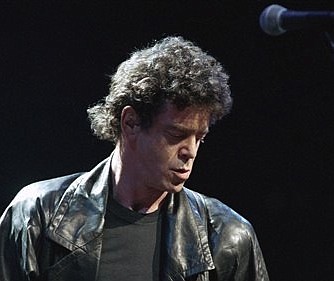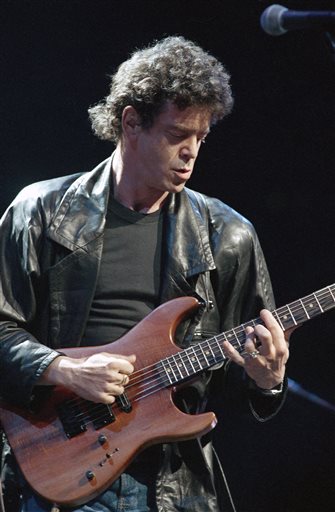Rock icon Lou Reed dead at 71
Sunday, October 27, 2013
NEW YORK - Lou Reed, the punk poet of rock n' roll who profoundly influenced generations of musicians as leader of the Velvet Underground and remained a vital solo performer for decades after, died Sunday age 71.
Reed died in Southampton, N.Y. of an ailment related to his recent liver transplant, according to his literary agent, Andrew Wylie, who added that Reed had been in frail health for months. Reed shared a home in Southampton with his wife and fellow musician, Laurie Anderson, whom he married in 2008.
Reed never approached the commercial success of such superstars as the Beatles and Bob Dylan, but no songwriter to emerge after Dylan so radically expanded the territory of rock lyrics. And no band did more than the Velvet Underground to open rock music to the avant-garde - to experimental theater, art, literature and film, to William Burroughs and Kurt Weill, to John Cage and Andy Warhol, Reed's early patron.
Indie rock essentially begins in the 1960s with Reed and the Velvets; the punk, New Wave and alternative rock movements of the 1970s, '80s and '90s were all indebted to Reed, whose songs were covered by R.E.M., Nirvana, Patti Smith and countless others.
"The first Velvet Underground record sold 30,000 copies in the first five years," Brian Eno, who produced albums by Roxy Music and Talking Heads among others, once said. "I think everyone who bought one of those 30,000 copies started a band!"
Reed's trademarks were a monotone of surprising emotional range and power; slashing, grinding guitar; and lyrics that were complex, yet conversational, designed to make you feel as if Reed were seated next to you. Known for his cold stare and gaunt features, he was a cynic and a seeker who seemed to embody downtown Manhattan culture of the 1960s and '70s and was as essential a New York artist as Martin Scorsese or Woody Allen. Reed's New York was a jaded city of drag queens, drug addicts and violence, but it was also as wondrous as any Allen comedy, with so many of Reed's songs explorations of right and wrong and quests for transcendence.
He had one top 20 hit, "Walk On the Wild Side," and many other songs that became standards among his admirers, from "Heroin" and "Sweet Jane" to "Pale Blue Eyes" and "All Tomorrow's Parties." Raised on doo-wop and Carl Perkins, Delmore Schwartz and the Beats, Reed helped shape the punk ethos of raw power, the alternative rock ethos of irony and droning music and the art-rock embrace of experimentation, whether the dual readings of Beat-influenced verse for "Murder Mystery," or, like a passage out of Burroughs' "Naked Lunch," the orgy of guns, drugs and oral sex on the Velvets' 15-minute "Sister Ray."
An outlaw in his early years, Reed would eventually perform at the White House, have his writing published in The New Yorker, be featured by PBS in an "American Masters" documentary and win a Grammy in 1999 for Best Long Form Music Video. The Velvet Underground was inducted into the Rock and Roll of Fame in 1996 and their landmark debut album, "The Velvet Underground & Nico," was added to the Library of Congress' registry in 2006.
Reed called one song "Growing Up in Public" and his career was an ongoing exhibit of how any subject could be set to rock music - the death of a parent ("Standing On Ceremony), AIDS ("The Halloween Parade"), some favorite movies and plays ("Doin' the Things That We Want To"), racism ("I Want to be Black"), the electroshock therapy he received as a teen ("Kill Your Sons").
Reviewing Reed's 1989 topical album "New York," Village Voice critic Robert Christgau wrote that "the pleasure of the lyrics is mostly tone and delivery - plus the impulse they validate, their affirmation that you can write songs about this stuff. Protesting, elegizing, carping, waxing sarcastic, forcing jokes, stating facts, garbling what he just read in the Times, free-associating to doomsday, Lou carries on a New York conversation - all that's missing is a disquisition on real estate."
He was one of rock's archetypal tough guys, but he grew up middle class - an accountant's son raised on Long Island. Reed was born to be a suburban dropout. He hated school, loved rock n' roll, fought with his parents and attacked them in song for forcing him to undergo electroshock therapy as a supposed "cure" for being bisexual. "Families that live out in the suburbs often make each other cry," he later wrote.
His real break began in college. At Syracuse University, he studied under Schwartz, whom Reed would call the first "great man" he ever encountered. He credited Schwartz with making him want to become a writer and to express himself in the most concrete language possible. Reed honored his mentor in the song "My House," recounting how he connected with the spirit of the late, mad poet through a Oiuja board. "Blazing stood the proud and regal name Delmore," he sang.
Reed moved to New York City after college and traveled in the pop and art worlds, working as a house songwriter at the low-budget Pickwick Records and putting in late hours in downtown clubs. One of his Pickwick songs, the dance parody "The Ostrich," was considered commercial enough to record. Fellow studio musicians included a Welsh-born viola player, John Cale, with whom Reed soon performed in such makeshift groups as the Warlocks and the Primitives.
They were joined by a friend of Reed's from Syracuse, guitarist-bassist Sterling Morrison; and by an acquaintance of Morrison's, drummer Maureen Tucker, who tapped out simple, hypnotic rhythms while playing standing up. They renamed themselves the Velvet Underground after a Michael Leigh book about the sexual subculture. By the mid-1960s, they were rehearsing at Warhol's "Factory," a meeting ground of art, music, orgies, drug parties and screen tests for films that ended up being projected onto the band while it performed, part of what Warhol called the "Floating Plastic Inevitable."
"Warhol was the great catalyst," Reed told BOMB magazine in 1998. "It all revolved around him. It all happened very much because of him. He was like a swirl, and these things would come into being: Lo and behold multimedia. There it was. No one really thought about it, it was just fun."

